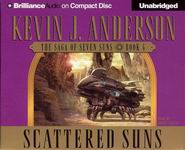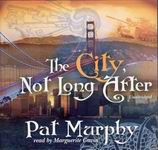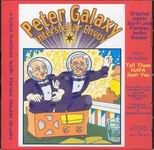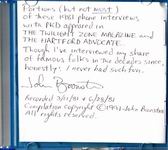
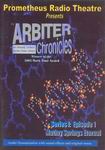 The Arbiter Chronicles: Series 1: Episode 1: Mutiny Springs Eternal
The Arbiter Chronicles: Series 1: Episode 1: Mutiny Springs Eternal
Written and Directed by Steven H. Wilson; Performed by a full cast
1 CD – 50 Minutes [Audio Drama]
Publisher: Prometheus Radio Theatre
Published: 2003
Themes: / Science Fiction / Space Opera /
Centuries from now, humankind has colonized hundreds of worlds. Terra, humanity’s home, is a slum in the war zone, its people shunned by the genetically engineered elite whose ancestors were driven from its surface to settle the stars. Against the invasion of the evil Qraitian Empire. , the colonies aligned themselves in a loose, squabbling confederacy of worlds. The strongest weapon in their arsenal is a space navy which has held back the Qraitian threat for decades. Jan Atal, celebrated veteran of the last Qraitian War, found himself a teacher in a time of peace. Now he has assembled his most promising students aboard the patrol ship Arbiter. There he makes them ready, for in his heart he knows that this peace can not last.
— Introduction to The Arbiter Chronicles by Steven H. Wilson
This is the first installment of a space opera audio drama series called The Arbiter Chronicles. As of this writing, the eight episodes of Series 1 have been produced, as have the first five episodes of Series 2. All them are available at Prometheus Radio Theatre.
In the booklet that came with the CD, Steven H. Wilson, the writer/director of the program, says that The Arbiter Chronicles is a space opera that had been kicking around in his head for quite a while, and then an opportunity at a convention in Baltimore allowed him some time to put together a live performance of this drama on the main stage. The crowd liked it, so he started to produce them for sale on CD.
The drama itself is definitely entertaining and is in the tradition of Star Trek. The Arbiter is a military vessel modeled after the modern day Navy. The crew is mostly human, but includes some alien crew members like Midshipman Cernaq, who is from the planet of Phaeton. The story begins when the crew of the Arbiter discovers an old starship. The ship still works, and its crew is still on the planet below.
My only complaint is that there are too many info dump moments – moments when one character explains something to another character. The content of these conversations were very intriguing, and some of them could have made good stories in and of themselves.
The production quality is very good, with music and sound effects throughout. It’s interesting, entertaining audio theater.
Cast
Captain Jan Atal – David Keefer
Midshipman Terry Metcalfe – Steven H. Wilson
Midshipman Kevin Carson – Scott D. Farquhar
Midshipman Cernaq – Dan “Renfield” Corcoran
Midshipman Kayan’na Atal – Beatrice Kondo
Bos’n Aer’la – June Swords
Dr. Celia Faulkner – Cindy Shockey
L’lanck / Admiral Fournier / Announcer – Paul Balzc
Trace Stockard – Renee Wilson
Dr. Andrews – Andrew Bergstrom
Dawson – John Weber
Guards – Cindy Woods, John Weber
Posted by Scott D. Danielson
